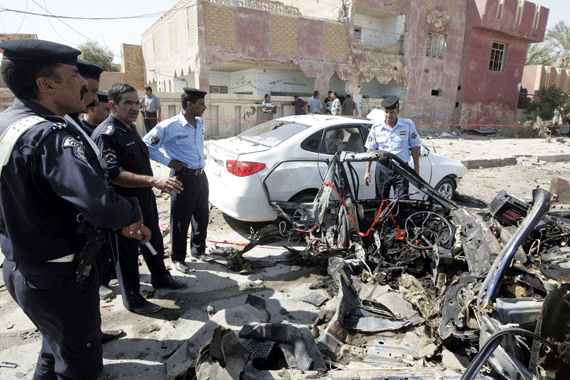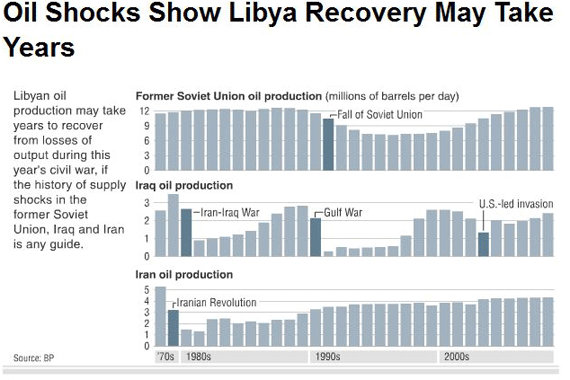Friday File: Checking in on Iraq
More on:

Above the Fold. While the blogosphere is now debating whether Libya marks a new era in U.S. foreign policy, represents a one-off that isn’t likely to be repeated, vindicates President Obama, or demonstrates the perils of “leading from behind,” I’ve been catching up on events in an earlier target of U.S. military intervention, Iraq. It no longer grabs headlines like it once did, but that doesn’t mean all is well. The best news is that civilian casualties have fallen more than 90 percent from the horrific levels they reached in 2006. However, car bombings and suicide attacks remain regrettably common, and there are troubling signs that Al Qaeda in Mesopotamia is reviving. Tensions within and across sectarian and ethnic divides continue as well. The 48,000 U.S. troops still in Iraq are scheduled to leave by the end of 2011, unless the Iraqi government asks them to stay longer. Many Iraqis would like at least some U.S. troops to stay behind to continue training the Iraqi military and possibly help keep tensions between Arabs and Kurds in the northern part of Iraq from escalating. Other Iraqis, most notably firebrand cleric Muqtada al-Sadr, are insisting that all U.S. forces must go and threatening violence if they don’t. Expect that decision to go down to the wire. The big question, of course, is whether Iraq is ready to stand on its own, or whether the U.S. departure will usher in a new round of violence. Either way, don’t be surprised when Iraq returns to the front pages later this year.
CFR Event of the Week. On Wednesday I moderated a conversation with Robert Danin and Daniel Serwer about the U.S. role in managing the transition to a post-Qaddafi Libya. They see reasons to be concerned about Libya’s future, as well as a few reasons to be cautiously optimistic. You can read the transcript or download the audio. I also flagged a few highlights from the conversation in a post earlier this week.
Read of the Week. Want to learn about what an emerging China is doing on the military front? Then the Defense Department has just the report for you. Released on Wednesday, Military and Security Developments Involving the People’s Republic of China: 2011 is chock full of nuggets about Chinese military strategy and the “expanding military capabilities” of the People’s Liberation Army. The report singles out China’s evolving maritime strategy for special attention. The Chinese Navy sent its first aircraft carrier out to sea for trials earlier this summer. The report also provides some nifty maps, but alas, no cool photographs. And in case you are wondering, DoD spent $73,212 to prepare the report.
Blog Post of the Week. Stewart Patrick tackles what will become a heavily debated question should Libyan strongman Muammar al-Qaddafi be captured alive and kept that way: who should try him for his crimes?
Poll Question of the Week. Gallup asked Republicans and Republican-leaning Independents who they would like to see win the Republican presidential nomination. Rick Perry took first place with 29 percent support, followed by Mitt Romney (17 percent), Ron Paul (13 percent), and Michele Bachmann (10 percent). Apparently taking your time to enter the race doesn’t necessarily create problems for your candidacy, and winning the Ames Straw Poll doesn’t guarantee a big boost in the polls.
Chart of the Week. One reason to be optimistic about Libya’s future is that it exports oil, meaning it can generate the funds it needs to cover the costs of reconstructing the roads, buildings, and industries destroyed by six months of fighting. One reason to be pessimistic about Libya’s future is that it may be quite some time before Libyan oil production returns to normal. That at least appears to be the lesson to be drawn from the charts below.
Source: Bloomberg News.
Too Good Not to Note. Liz Economy thinks that too much is being made of the recent brawl between the Georgetown Hoyas men’s basketball team and China’s Bayi men’s basketball team. Stephen Walt thinks that the Libyan Revolution won’t matter much. Stephen Roach argues that the downward revisions in the growth of U.S. consumer spending means that we are looking at slower economic growth and much higher federal budget deficits over the next several years. Jon Gertner asks whether America needs manufacturing.
Perils of Prediction. "Obama will do nothing on gay rights, wary of giving ammo to already fired-up conservatives during an election year.” Newsweek, “Our Political Predictions for 2010.” On December 22, 2010, President Obama signed the Don’t Ask Don’t Tell Repeal Act into law.
Quote to Ponder. “If I had eight hours to chop down a tree, I’d spend six hours sharpening my ax.” Attributed to Abraham Lincoln.
A Reason to Smile. Being with your father to celebrate his eighty-first birthday.
More on:
 Online Store
Online Store
